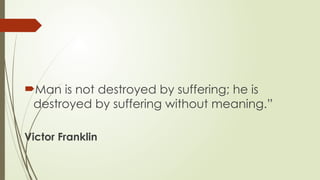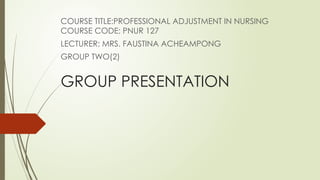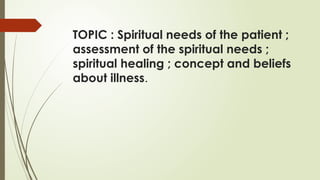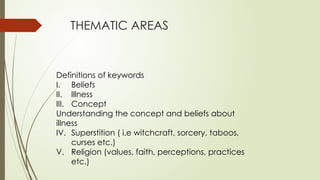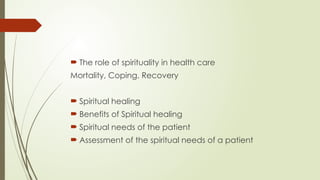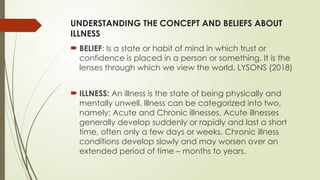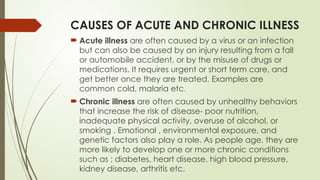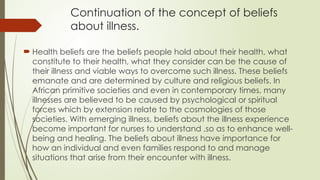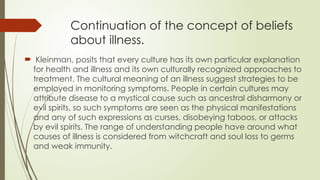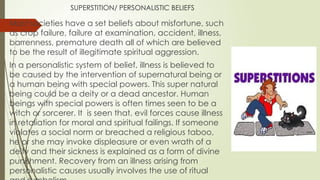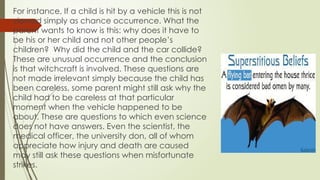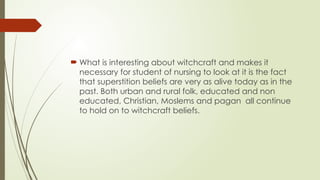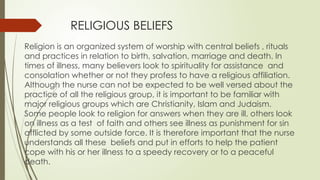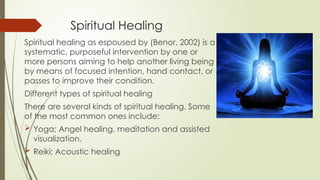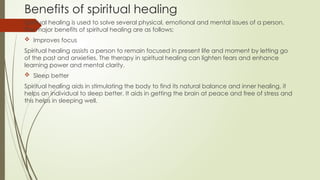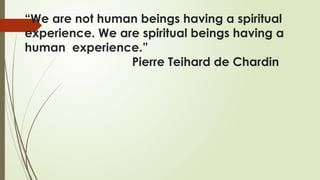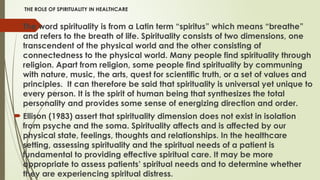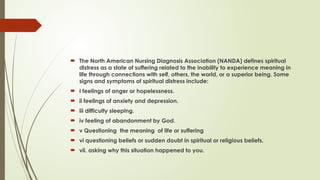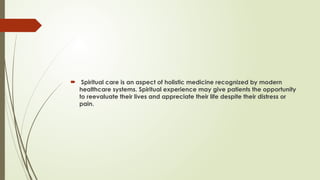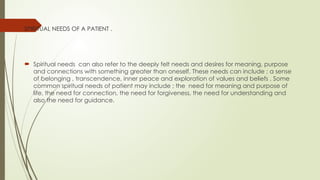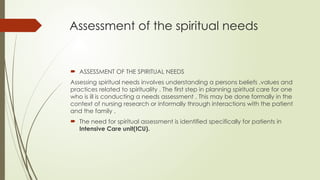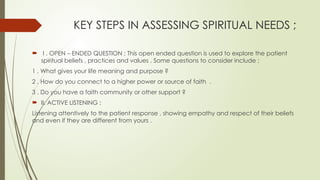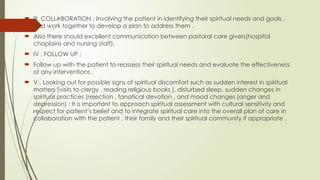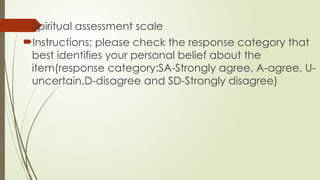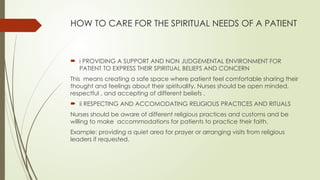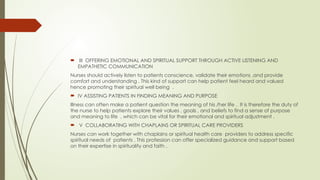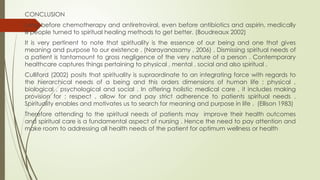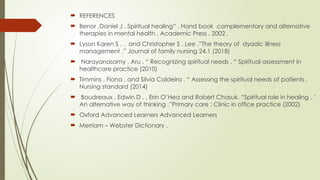professional adjustment in nursing .pptx
- 1. ’é┤Man is not destroyed by suffering; he is destroyed by suffering without meaning.ŌĆØ Victor Franklin
- 2. GROUP PRESENTATION COURSE TITLE:PROFESSIONAL ADJUSTMENT IN NURSING COURSE CODE: PNUR 127 LECTURER: MRS. FAUSTINA ACHEAMPONG GROUP TWO(2)
- 3. TOPIC : Spiritual needs of the patient ; assessment of the spiritual needs ; spiritual healing ; concept and beliefs about illness.
- 4. THEMATIC AREAS Definitions of keywords I. Beliefs II. Illness III. Concept Understanding the concept and beliefs about illness IV. Superstition ( i.e witchcraft, sorcery, taboos, curses etc.) V. Religion (values, faith, perceptions, practices etc.)
- 5. ’é┤ The role of spirituality in health care Mortality, Coping, Recovery ’é┤ Spiritual healing ’é┤ Benefits of Spiritual healing ’é┤ Spiritual needs of the patient ’é┤ Assessment of the spiritual needs of a patient
- 6. UNDERSTANDING THE CONCEPT AND BELIEFS ABOUT ILLNESS ’é┤ BELIEF: Is a state or habit of mind in which trust or confidence is placed in a person or something. It is the lenses through which we view the world. LYSONS (2018) ’é┤ ILLNESS: An illness is the state of being physically and mentally unwell. Illness can be categorized into two, namely; Acute and Chronic illnesses. Acute illnesses generally develop suddenly or rapidly and last a short time, often only a few days or weeks. Chronic illness conditions develop slowly and may worsen over an extended period of time ŌĆō months to years.
- 7. CAUSES OF ACUTE AND CHRONIC ILLNESS ’é┤ Acute illness are often caused by a virus or an infection but can also be caused by an injury resulting from a fall or automobile accident, or by the misuse of drugs or medications. It requires urgent or short term care, and get better once they are treated. Examples are common cold, malaria etc. ’é┤ Chronic illness are often caused by unhealthy behaviors that increase the risk of disease- poor nutrition, inadequate physical activity, overuse of alcohol, or smoking . Emotional , environmental exposure, and genetic factors also play a role. As people age, they are more likely to develop one or more chronic conditions such as ; diabetes, heart disease, high blood pressure, kidney disease, arthritis etc.
- 8. Continuation of the concept of beliefs about illness. ’é┤ Health beliefs are the beliefs people hold about their health, what constitute to their health, what they consider can be the cause of their illness and viable ways to overcome such illness. These beliefs emanate and are determined by culture and religious beliefs. In African primitive societies and even in contemporary times, many illnesses are believed to be caused by psychological or spiritual forces which by extension relate to the cosmologies of those societies. With emerging illness, beliefs about the illness experience become important for nurses to understand ,so as to enhance well┬Ł - being and healing. The beliefs about illness have importance for how an individual and even families respond to and manage situations that arise from their encounter with illness.
- 9. Continuation of the concept of beliefs about illness. ’é┤ Kleinman, posits that every culture has its own particular explanation for health and illness and its own culturally recognized approaches to treatment. The cultural meaning of an illness suggest strategies to be employed in monitoring symptoms. People in certain cultures may attribute disease to a mystical cause such as ancestral disharmony or evil spirits, so such symptoms are seen as the physical manifestations and any of such expressions as curses, disobeying taboos, or attacks by evil spirits. The range of understanding people have around what causes of illness is considered from witchcraft and soul loss to germs and weak immunity.
- 10. SUPERSTITION/ PERSONALISTIC BELIEFS Most societies have a set beliefs about misfortune, such as crop failure, failure at examination, accident, illness, barrenness, premature death all of which are believed to be the result of illegitimate spiritual aggression. In a personalistic system of belief, illness is believed to be caused by the intervention of supernatural being or a human being with special powers. This super natural being could be a deity or a dead ancestor. Human beings with special powers is often times seen to be a witch or sorcerer. It is seen that, evil forces cause illness in retaliation for moral and spiritual failings. If someone violates a social norm or breached a religious taboo, he or she may invoke displeasure or even wrath of a deity and their sickness is explained as a form of divine punishment. Recovery from an illness arising from personalistic causes usually involves the use of ritual
- 11. For instance, If a child is hit by a vehicle this is not viewed simply as chance occurrence. What the parent wants to know is this: why does it have to be his or her child and not other peopleŌĆÖs children? Why did the child and the car collide? These are unusual occurrence and the conclusion is that witchcraft is involved. These questions are not made irrelevant simply because the child has been careless, some parent might still ask why the child had to be careless at that particular moment when the vehicle happened to be about. These are questions to which even science does not have answers. Even the scientist, the medical officer, the university don, all of whom appreciate how injury and death are caused may still ask these questions when misfortunate strikes.
- 12. ’é┤ What is interesting about witchcraft and makes it necessary for student of nursing to look at it is the fact that superstition beliefs are very as alive today as in the past. Both urban and rural folk, educated and non educated, Christian, Moslems and pagan all continue to hold on to witchcraft beliefs.
- 13. RELIGIOUS BELIEFS Religion is an organized system of worship with central beliefs , rituals and practices in relation to birth, salvation, marriage and death. In times of illness, many believers look to spirituality for assistance and consolation whether or not they profess to have a religious affiliation. Although the nurse can not be expected to be well versed about the practice of all the religious group, it is important to be familiar with major religious groups which are Christianity, Islam and Judaism. Some people look to religion for answers when they are ill, others look on illness as a test of faith and others see illness as punishment for sin afflicted by some outside force. It is therefore important that the nurse understands all these beliefs and put in efforts to help the patient cope with his or her illness to a speedy recovery or to a peaceful death.
- 14. Spiritual Healing Spiritual healing as espoused by (Benor, 2002) is a systematic, purposeful intervention by one or more persons aiming to help another living being by means of focused intention, hand contact, or passes to improve their condition. Different types of spiritual healing There are several kinds of spiritual healing. Some of the most common ones include: ’āś Yoga; Angel healing, meditation and assisted visualization. ’āś Reiki; Acoustic healing
- 15. Benefits of spiritual healing Spiritual healing is used to solve several physical, emotional and mental issues of a person. The major benefits of spiritual healing are as follows; ’üČ Improves focus Spiritual healing assists a person to remain focused in present life and moment by letting go of the past and anxieties. The therapy in spiritual healing can lighten fears and enhance learning power and mental clarity. ’üČ Sleep better Spiritual healing aids in stimulating the body to find its natural balance and inner healing, it helps an individual to sleep better. It aids in getting the brain at peace and free of stress and this helps in sleeping well.
- 16. ’üČRe-Energizes body organs Spiritual healing re-energizes all your body organs and clears up the energy nerve tract which enhances their performance. It helps the kidney, liver and other parts to function well. ’üČ Pain relief You can get relief from all kinds of pains ie constant and chronic pains such as; migraines, muscle and joint pains.
- 17. ŌĆ£We are not human beings having a spiritual experience. We are spiritual beings having a human experience.ŌĆØ Pierre Teihard de Chardin
- 18. THE ROLE OF SPIRITUALITY IN HEALTHCARE ’é┤ The word spirituality is from a Latin term ŌĆ£spiritusŌĆØ which means ŌĆ£breatheŌĆØ and refers to the breath of life. Spirituality consists of two dimensions, one transcendent of the physical world and the other consisting of connectedness to the physical world. Many people find spirituality through religion. Apart from religion, some people find spirituality by communing with nature, music, the arts, quest for scientific truth, or a set of values and principles. It can therefore be said that spirituality is universal yet unique to every person. It is the spirit of human being that synthesizes the total personality and provides some sense of energizing direction and order. ’é┤ Ellison (1983) assert that spirituality dimension does not exist in isolation from psyche and the soma. Spirituality affects and is affected by our physical state, feelings, thoughts and relationships. In the healthcare setting, assessing spirituality and the spiritual needs of a patient is fundamental to providing effective spiritual care. It may be more appropriate to assess patientsŌĆÖ spiritual needs and to determine whether they are experiencing spiritual distress.
- 19. ’é┤ The North American Nursing Diagnosis Association (NANDA) defines spiritual distress as a state of suffering related to the inability to experience meaning in life through connections with self, others, the world, or a superior being. Some signs and symptoms of spiritual distress include: ’é┤ I feelings of anger or hopelessness. ’é┤ ii feelings of anxiety and depression. ’é┤ iii difficulty sleeping. ’é┤ iv feeling of abandonment by God. ’é┤ v Questioning the meaning of life or suffering ’é┤ vi questioning beliefs or sudden doubt in spiritual or religious beliefs. ’é┤ vii. asking why this situation happened to you.
- 20. ’é┤ Spiritual care is an aspect of holistic medicine recognized by modern healthcare systems. Spiritual experience may give patients the opportunity to reevaluate their lives and appreciate their life despite their distress or pain.
- 21. SPIRITUAL NEEDS OF A PATIENT . ’é┤ Spiritual needs can also refer to the deeply felt needs and desires for meaning, purpose and connections with something greater than oneself. These needs can include ; a sense of belonging , transcendence, inner peace and exploration of values and beliefs . Some common spiritual needs of patient may include ; the need for meaning and purpose of life, the need for connection, the need for forgiveness, the need for understanding and also the need for guidance.
- 22. Assessment of the spiritual needs ’é┤ ASSESSMENT OF THE SPIRITUAL NEEDS Assessing spiritual needs involves understanding a persons beliefs ,values and practices related to spirituality . The first step in planning spiritual care for one who is ill is conducting a needs assessment . This may be done formally in the context of nursing research or informally through interactions with the patient and the family . ’é┤ The need for spiritual assessment is identified specifically for patients in Intensive Care unit(ICU).
- 23. KEY STEPS IN ASSESSING SPIRITUAL NEEDS ; ’é┤ I . OPEN ŌĆō ENDED QUESTION ; This open ended question is used to explore the patient spiritual beliefs , practices and values . Some questions to consider include ; 1 . What gives your life meaning and purpose ? 2 . How do you connect to a higher power or source of faith . 3 . Do you have a faith community or other support ? ’é┤ II. ACTIVE LISTENING ; Listening attentively to the patient response , showing empathy and respect of their beliefs and even if they are different from yours .
- 24. ’é┤ III. COLLABORATION ; Involving the patient in identifying their spiritual needs and goals , and work together to develop a plan to address them . ’é┤ Also there should excellent communication between pastoral care givers(hospital chaplains and nursing staff). ’é┤ IV . FOLLOW UP ; ’é┤ Follow up with the patient to reassess their spiritual needs and evaluate the effectiveness of any interventions . ’é┤ V . Looking out for possible signs of spiritual discomfort such as sudden interest in spiritual matters (visits to clergy , reading religious books ), disturbed sleep, sudden changes in spiritual practices (rejection , fanatical devotion , and mood changes (anger and depression) : It is important to approach spiritual assessment with cultural sensitivity and respect for patientŌĆÖs belief and to integrate spiritual care into the overall plan of care in collaboration with the patient , their family and their spiritual community if appropriate .
- 25. ’é┤Spiritual assessment scale ’é┤Instructions; please check the response category that best identifies your personal belief about the item(response category:SA-Strongly agree, A-agree, U- uncertain,D-disagree and SD-Strongly disagree)
- 26. ’é┤ A. Personal faith ’é┤ 1. I believe that God is interested in all the activities of my future. ’é┤ SA___ A___ U___ D___ SD___ ’é┤ 2. I trust that God will take care of the future. ’é┤ SA___ A___ U___ D___ SD___ ’é┤ B. Religious practices ’é┤ 1. My relationship with God is strenghtened by personal prayer. ’é┤ SA___ A___ U___ D___ SD___ ’é┤ 2.Belonging to a church or faith group is an important part of my life. ’é┤ SA___ A___ U___ D___ SD___ ’é┤ C. Spiritual contentment ’é┤ 1. I feel far away fron God. ’é┤ SA___ A___ U___ D___ SD___ ’é┤ 2.I have done some things for which i fear God may not fogive me. ’é┤ SA___ A___ U___ D___ SD___
- 27. HOW TO CARE FOR THE SPIRITUAL NEEDS OF A PATIENT ’é┤ i PROVIDING A SUPPORT AND NON JUDGEMENTAL ENVIRONMENT FOR PATIENT TO EXPRESS THEIR SPIRITUAL BELIEFS AND CONCERN This means creating a safe space where patient feel comfortable sharing their thought and feelings about their spirituality. Nurses should be open minded, respectful , and accepting of different beliefs . ’é┤ ii RESPECTING AND ACCOMODATING RELIGIOUS PRACTICES AND RITUALS Nurses should be aware of different religious practices and customs and be willing to make accommodations for patients to practice their faith. Example: providing a quiet area for prayer or arranging visits from religious leaders if requested.
- 28. ’é┤ III OFFERING EMOTIONAL AND SPIRITUAL SUPPORT THROUGH ACTIVE LISTENING AND EMPATHETIC COMMUNICATION Nurses should actively listen to patients conscience, validate their emotions ,and provide comfort and understanding . This kind of support can help patient feel heard and valued hence promoting their spiritual well being . ’é┤ IV ASSISTING PATIENTS IN FINDING MEANING AND PURPOSE Illness can often make a patient question the meaning of his /her life . It is therefore the duty of the nurse to help patients explore their values , goals , and beliefs to find a sense of purpose and meaning to life , which can be vital for their emotional and spiritual adjustment . ’é┤ V COLLABORATING WITH CHAPLAINS OR SPIRITUAL CARE PROVIDERS Nurses can work together with chaplains or spiritual health care providers to address specific spiritual needs of patients . This profession can offer specialized guidance and support based on their expertise in spirituality and faith .
- 29. CONCLUSION Long before chemotherapy and antiretroviral, even before antibiotics and aspirin, medically ill people turned to spiritual healing methods to get better. (Boudreaux 2002) It is very pertinent to note that spirituality is the essence of our being and one that gives meaning and purpose to our existence . (Narayanasamy , 2006) . Dismissing spiritual needs of a patient is tantamount to gross negligence of the very nature of a person . Contemporary healthcare captures things pertaining to physical , mental , social and also spiritual . Culliford (2002) posits that spirituality is supraordinate to an integrating force with regards to the hierarchical needs of a being and this orders dimensions of human life ; physical , biological , psychological and social . In offering holistic medical care , it includes making provision for ; respect , allow for and pay strict adherence to patients spiritual needs . Spirituality enables and motivates us to search for meaning and purpose in life . (Ellison 1983) Therefore attending to the spiritual needs of patients may improve their health outcomes and spiritual care is a fundamental aspect of nursing . Hence the need to pay attention and make room to addressing all health needs of the patient for optimum wellness or health
- 30. ’é┤ REFERENCES ’é┤ Benor ,Daniel J . Spiritual healingŌĆØ . Hand book complementary and alternative therapies in mental health . Academic Press , 2002 . ’é┤ Lyson Karen S . , and Christopher S . Lee .ŌĆØThe theory of dyadic illness management .ŌĆØ Journal of family nursing 24.1 (2018) ’é┤ Narayanasamy , Aru . ŌĆ£ Recognizing spiritual needs . ŌĆ£ Spiritual assessment in healthcare practice (2010) ’é┤ Timmins , Fiona , and Silvia Caldeira . ŌĆ£ Assessing the spiritual needs of patients . Nursing standard (2014) ’é┤ Boudreaux , Edwin D . , Erin OŌĆÖHea and Robert Chasuk. ŌĆ£Spiritual role in healing . ŌĆś An alternative way of thinking .ŌĆØPrimary care : Clinic in office practice (2002) ’é┤ Oxford Advanced Learners Advanced Learners ’é┤ Merriam ŌĆō Webster Dictionary .
- 31. SANYELAH DAMIAN AS5653/23 NANA YAW KONADU AS5612/23 BAFFOE KAREN HAPPUCH AS5581/23 KUKUA BIAMA ANKRAH AS5562/23 KYEI VERA AS56218/23 NKRUMAH DEBORAH AS5626/23 AFARI JERRY ASANTE AS5795/23 ASADU BENEDICTA AS5573/23 PEPRAH JULIET ABENA AS5650/23 KWARTENG ADDOWAA AS5617/23
